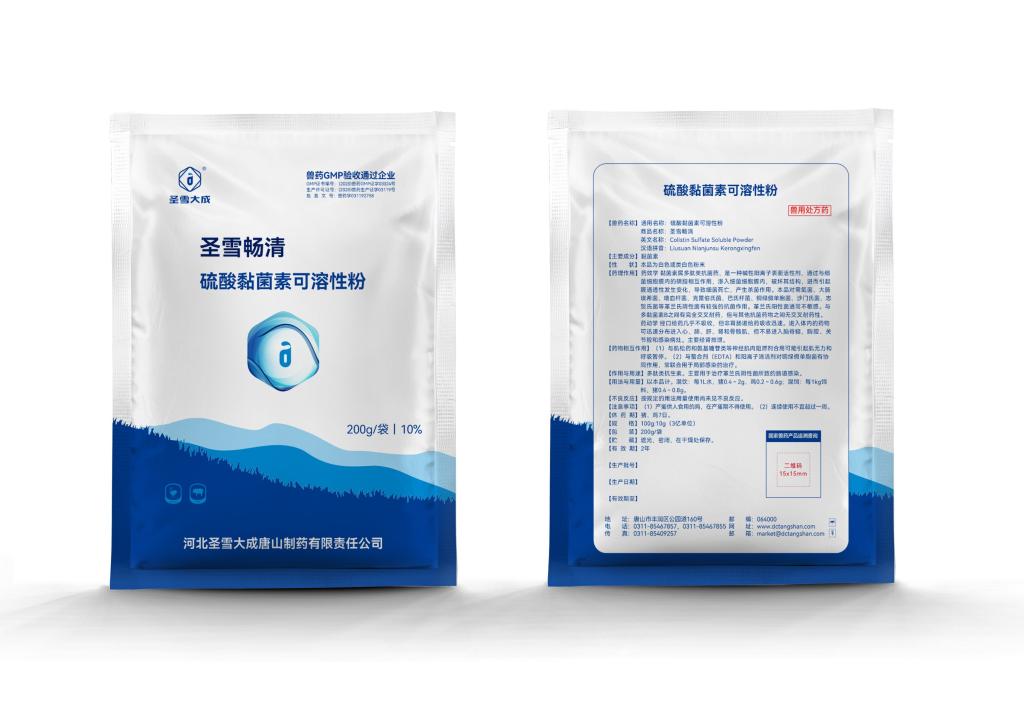Tel:0086 18231198596

News
Current Position:
Home >
News
>Breakthroughs in Veterinary Medicine: Colistin Sulfate Soluble Powder Innovations.
Breakthroughs in Veterinary Medicine: Colistin Sulfate Soluble Powder Innovations.
TIME:2024-01-03
Historical Context:
Colistin, a polymyxin antibiotic, was initially developed for human use in the mid-20th century. However, its use in human medicine waned due to concerns about nephrotoxicity and the availability of safer alternatives. In the veterinary context, colistin sulfate became a valuable tool for preventing and treating bacterial infections in various animal species.
Applications in Veterinary Medicine:
a. Disease Prevention:
Colistin sulfate soluble powder has been widely used in veterinary medicine to prevent and control bacterial infections in livestock, poultry, and companion animals. Its broad-spectrum antimicrobial activity makes it effective against a range of bacteria.
b. Growth Promotion:
In addition to its therapeutic uses, colistin sulfate has been employed as a growth promoter in animal feed. Subtherapeutic doses are administered to enhance weight gain and feed efficiency, contributing to increased productivity in the livestock industry.
Antibiotic Resistance Concerns:
a. Development of Resistance:
The emergence of antibiotic-resistant bacteria poses a significant challenge in veterinary medicine. Continuous use of colistin sulfate has been associated with the development of resistance, raising concerns about the effectiveness of this antibiotic in treating bacterial infections in animals.
b. One Health Approach:
The interconnectedness of human, animal, and environmental health has prompted a "One Health" approach. Recognizing that antibiotic resistance in animals can impact human health, veterinarians, researchers, and policymakers are working collaboratively to address this global challenge.
Innovations in Formulations:
a. Controlled Release Technologies:
Innovations in formulations aim to optimize the delivery of colistin sulfate to maximize efficacy while minimizing the risk of resistance. Controlled release technologies offer sustained release of the antibiotic, providing a more targeted and prolonged therapeutic effect.
b. Nanoparticle Delivery Systems:
Nanoparticle delivery systems represent a frontier in veterinary medicine. By encapsulating colistin sulfate in nanoparticles, researchers aim to enhance drug stability, improve bioavailability, and reduce the frequency of administration, contributing to more sustainable use.
Precision Veterinary Medicine:
a. Targeted Therapies:
The concept of precision medicine has extended to veterinary practice. Targeted therapies that identify specific bacterial strains and tailor antibiotic treatments accordingly help minimize the broad-spectrum impact of colistin sulfate, reducing the risk of resistance.
b. Diagnostic Advancements:
Rapid diagnostic tools have become integral in precision veterinary medicine. Advanced diagnostics enable veterinarians to identify bacterial infections quickly, facilitating targeted antibiotic treatments and reducing the reliance on broad-spectrum antibiotics like colistin sulfate.
Responsible Use and Stewardship:
a. Veterinary Guidelines:
To address antibiotic resistance concerns, veterinary organizations worldwide have developed guidelines for the responsible use of colistin sulfate and other antibiotics. These guidelines emphasize prudent use, dosage optimization, and adherence to withdrawal periods to minimize the risk of residues in animal products.
b. Veterinarian Education:
Continued education for veterinarians is crucial in promoting responsible antibiotic use. Training programs that emphasize the principles of antibiotic stewardship, diagnostic accuracy, and alternative therapies contribute to a more sustainable approach to veterinary medicine.
Alternatives and Complementary Approaches:
a. Probiotics and Prebiotics:
Researchers are exploring alternatives to traditional antibiotics, including the use of probiotics and prebiotics. These substances promote a healthy gut microbiome, potentially reducing the need for antibiotics and mitigating the risk of resistance.
b. Plant-Derived Compounds:
Interest is growing in the use of plant-derived compounds with antimicrobial properties in veterinary medicine. Research on botanical extracts and essential oils aims to identify effective alternatives or complementary treatments to colistin sulfate.
Regulatory Measures and Global Cooperation:
a. Global Regulations:
Regulatory agencies worldwide have implemented measures to address antibiotic resistance in veterinary medicine. These measures include restrictions on the use of certain antibiotics, surveillance programs, and collaborative efforts to monitor and control the spread of resistant bacteria.
b. International Collaboration:
Given the global nature of antibiotic resistance, international collaboration is essential. Veterinary professionals, researchers, and policymakers are working together to share knowledge, best practices, and research findings to address the challenges associated with colistin sulfate and other antibiotics.
Challenges in Implementation:
a. Compliance and Enforcement:
Ensuring compliance with responsible use guidelines and regulations is a challenge in veterinary medicine. Effective enforcement mechanisms and monitoring programs are essential to encourage adherence to best practices.
b. Economic Considerations:
The economic implications of transitioning to alternative therapies or implementing precision medicine practices can be a barrier for some farmers and veterinary practitioners. Policymakers and industry stakeholders must consider strategies to support the adoption of sustainable practices.
Future Outlook:
The future of colistin sulfate soluble powder in veterinary medicine hinges on a balanced approach that addresses the need for disease prevention while minimizing the risks of antibiotic resistance. Innovations in formulations, precision medicine, and responsible use practices are key components of a sustainable and effective future for veterinary antibiotics.
Conclusion:
Breakthroughs in veterinary medicine regarding colistin sulfate soluble powder are pivotal in navigating the challenges associated with antibiotic resistance. As the industry embraces innovations, precision medicine, responsible use practices, and global cooperation, veterinarians and researchers are paving the way for a more sustainable and effective approach to managing bacterial infections in animals. The ongoing evolution of veterinary medicine emphasizes the importance of balancing therapeutic needs with a commitment to global health and environmental stewardship.

 CONTACT
CONTACT




